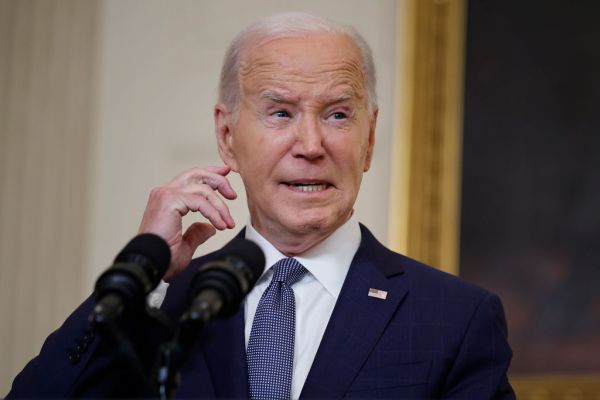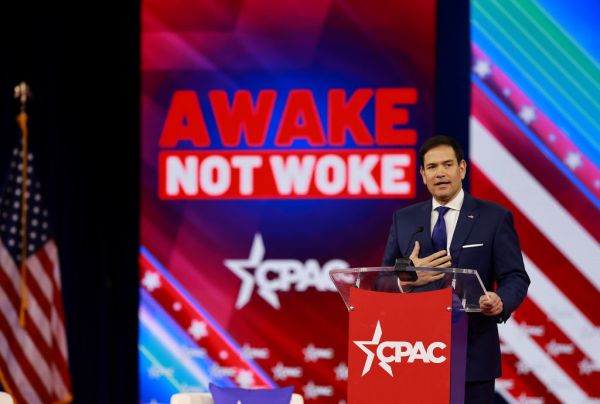Happy Monday! The NBA Finals and Stanley Cup Finals are happening now—but we are, of course, more invested in Donald Trump’s veepstakes.
Up to Speed
- The National Republican Senatorial Committee is putting seven figures into a ground game to support former Rep. Mike Rogers in his bid for Michigan’s Senate seat against presumptive Democratic nominee Rep. Elissa Slotkin. The investment includes support for Republican voter turnout and persuading swayable voters, according to a Friday report from The Hill. “Along with our strong partnership with the Trump campaign and Republicans up and down the ballot, this investment allows our team to expand our outreach and share Mike’s message using a proven data-driven approach, and help ensure we defeat the Biden-Slotkin agenda to flip Michigan red in November,” Rogers spokesman Chris Gustafson said in an emailed statement.
- But one of Rogers’ primary opponents, businessman Sandy Pensler, similarly announced the launch of a seven-figure media buy Monday, starting with an ad titled “The Truth About Benghazi.” It features Mark Geist, a retired Marine who defended the U.S. embassy in Benghazi, Libya, during the 2012 terrorist attack, attacking Rogers for his role as chair of the House Intelligence Committee during the investigation into the attack. “Mike Rogers went along with Hillary Clinton. I believe Mike Rogers wants Americans to forget what happened in Benghazi,” Geist says. Pensler has previously attacked Rogers, who has endorsements from both the NRSC and former President Donald Trump, for his role in the investigation. Pensler released a similar ad in May that drew condemnation from former Secretary of State Mike Pompeo, who served on the House’s Select Committee on Benghazi in 2014 and said in an X post the day the May ad was released that “any idea that there was a cover-up is just absurd and false.”
- Alabama Sen. Tommy Tuberville’s views on Russia’s war in Ukraine make him an “outlier” in the Republican Party, South Carolina Sen. Lindsay Graham said on CBS News’ Face the Nation Sunday. Graham’s comments came after Tuberville called Ukrainian President Volodymyr Zelensky a “dictator” and said Russian President Vladimir Putin “just wants to make sure that he does not have United States weapons in Ukraine pointing at Moscow.” Asked about the comments, Graham responded, “Sen. Tuberville's analysis really misses what Putin is all about. He's an outlier, I think, in the Republican Party. I like him personally.”
- House Speaker Mike Johnson’s team is whipping votes for a bill that would allow current and former presidents to move state charges to federal courts in response to Trump’s guilty verdict in his hush money trial, making them subject to the White House’s pardoning power, Axios reported Friday. In the unlikely event that the bill—the No More Political Prosecutions Act—passes both chambers and becomes law, Trump could move his Georgia election subversion case to federal court, meaning a president could pardon him should he face conviction. However, the bill’s passing would not open the door to presidential expungement of the hush money conviction, which was already decided in a state court, where the chief executive has no authority to pardon.
- After concluding a rally in Las Vegas on Sunday, Trump endorsed Army veteran Sam Brown in Nevada’s GOP Senate primary, which will take place Tuesday. “Sam Brown is a FEARLESS AMERICAN PATRIOT, a Purple Heart Recipient, who has proven he has the ‘PURE GRIT’ and COURAGE to take on our Enemies, both Foreign and Domestic,” Trump said in a Truth Social post. “Sam is now running for U.S. Senate in the Great State of Nevada, primarily because he knows that Crooked Joe Biden and the Radical Left are A THREAT TO DEMOCRACY.” Should Brown win Tuesday—which is likely now that he has the former president’s backing, he will take on Democratic Sen. Jacky Rosen in what the Cook Political Report has rated as a toss-up. A poll from the same organization released a couple of weeks ago, however, had Rosen up 7 points against a to-be-determined Republican nominee.
- A group of Hollywood veterans and former campaign staffers of Joe Biden are starting Won’t PAC Down, a super PAC that will pitch the president’s campaign to voters under 30. Rather than using celebrity star power to sell Biden’s accomplishments, the group—which consists of people who have worked in creative roles on such projects as Parks and Recreation, Saturday Night Live, and Big Mouth—will work to craft ads that sway less political voters in the age group. “We’re taking the best young writers and directors, who are the age and demographics of the people we’re targeting, using poll-tested messaging, and shaping it in a way that will resonate with young people and get them excited,” Travis Helwig, an experienced creative writer leading the super PAC’s writers room, told Politico.
‘It’s About Inflation’

The interest rate that dictates housing costs could tick lower this summer, boosting President Joe Biden’s embattled reelection campaign at a critical juncture.
Reduced mortgage rates would ease the financial burden of home ownership for millions of Americans. Property would be more affordable for buyers and for owners, easier to sell, and less expensive to hang onto after taking advantage of lower rates and refinancing existing mortgages. This development could blunt some of the political headwinds threatening Biden in his rematch with presumptive Republican nominee Donald Trump.
But possible action to lower interest rates by the Federal Reserve at its scheduled late-July meeting won’t be a cure-all for the inflation spike that hit after Biden assumed office nearly three and a half years ago.
That’s because reducing the interest rate the Federal Reserve charges banks to borrow money won’t do much to reduce the price of groceries, gasoline, and other staples that impact a family’s budget the most. Indeed, even though inflation is dropping and, crucially, normalizing enough to position the Federal Reserve to consider cutting interest rates, the cost of household goods, restaurant outings, and vacation travel are remaining stubbornly higher than before prices skyrocketed in 2021.
Meanwhile, other benefits of lower interest rates, including reduced consumer credit card debt and business investment, are unlikely to take hold before the November 5 elections.
“The Fed has gotten inflation back under control but the voter wants deflation. They want prices to drop 5 or 10 percent, and that’s very unlikely to happen,” Brendan Walsh, an economic analyst with Markets Policy Partners, explained to Dispatch Politics. “People complain about inflation; what they want is deflation.”
Annual inflation eased to 3.4 percent in April, with the rate of increase for food and energy-related costs coming in at 2.2 percent and 2.6 percent, respectively (rent inflation is higher, at 5.5 percent.) These figures suggest the Federal Reserve may conclude during its July meeting that the effort to combat inflation has been successful and that the time is right to cut interest rates.
The Fed may also be cognizant of bad optics. Implementing a reduction after its later meeting in September, for example—just seven weeks before the election—might be interpreted as a political move aimed at propelling Biden over Trump.
But prices continue to fluctuate. So, while inflation is on a downward trajectory, costs for various consumer goods have bounced up and down from month to month. That dynamic is obscuring economic indicators that suggest the fundamentals of the economy are strong. For instance, a Bureau of Labor Statistics report issued Friday shows 272,000 jobs created in May and that hourly wages were up 4.1 percent from a year earlier.
Unemployment inched up to 4 percent, but that is still significantly low, historically. And the stock market is humming. However, Trump leads Biden 45.4 percent to 44.6 percent in national polling averages—an advantage that stretches back to last September—while the president’s job approval rating is underwater at just under 40 percent. The former president also leads his successor in surveys when voters are asked who they trust more to manage the economy. This is frustrating for Democrats, who point to the progress Biden has made since becoming president amid the financially devastating coronavirus pandemic.
“The economy we have should reelect an incumbent,” said Jim Kessler, executive vice president for policy at Third Way, a centrist-Democratic think tank in Washington. “One demerit on the economy is inflation. That’s a real thing. But it’s come down quite a bit.” Biden appears to recognize just how much inflation is weighing on voters’ minds.
“The great American comeback continues, but we still have to make more progress,” Biden said in a statement marking the May jobs report, adding: “I will keep fighting to lower costs for families like the ones I grew up with in Scranton.” (The president lived in Scranton, Pennsylvania, as a child before his family moved to Delaware.)
David Winston, a Republican pollster, keeps a chart measuring what he calls the “presidential inflation rate, which he measures as the current rate of inflation versus where it stood the month Biden was inaugurated. Per this statistic, prices are up nearly 20 percent since Biden took office, while wages since January of 2021 are up only 14.1 percent—meaning wage increases have not kept pace with costs.
With less than five months until Election Day and early voting beginning even sooner, Republicans say Biden is in a box canyon with no way out, regardless of what decision the Federal Reserve makes regarding interest rates.
“It’s about inflation,” Winston said. “When you lose purchasing power, you notice it.”
Biden Struggles With Black and Latino Voters, New Poll Shows
A new national presidential poll from CBS News finds a dead heat between President Joe Biden and former President Donald Trump. According to the poll, conducted between June 5 and June 7, 50 percent of likely voters said they preferred Trump and 49 percent said they preferred Biden.
It’s the latest poll to show a tightening of the race after Trump jumped to a significant lead at the beginning of the year. Yet the poll indicates both areas of concern for the incumbent president as well as opportunities for growth.
Some specific demographic groups demonstrate where Biden is struggling nationally, particularly compared to 2020 exit polls. The Democratic president is holding steady with where he was four years ago with voters under 30. He’s getting 59 percent to Trump’s 39 percent in the CBS poll, not far from his performance with that cohort in 2020 (60 percent to Trump’s 36 percent). In the new poll, Biden is also winning about the same with white, college-educated voters, getting 50 percent to Trump’s 48 percent. Again, that’s roughly where both were in 2020 (Biden won 51 percent and Trump won 48 percent).
But Biden appears to be suffering with black and Hispanic/Latino voters. In 2020, Biden won 87 percent of the black vote and 65 percent of the Latino vote, according to exit polls. Trump earned 12 percent of the black vote, at the top limit for what most recent Republican presidential candidates have received, and 32 percent of the Latino vote.
But CBS News’ poll indicates how far Biden has fallen with these two demographic groups. He earns just 81 percent of the black vote to Trump’s 18 percent—a level which would be a record for a Republican presidential candidate in the modern era and could make the difference in key swing states like Michigan, Pennsylvania, and Georgia. And Biden’s fall with Hispanic voters looks even worse for the president, with Biden and Trump essentially tied, 50 percent to 49 percent.
There are several issue areas where voters say the country is doing poorly—another bad sign for Biden. A total of 70 percent of those polled say things in America are going “somewhat badly” or “very badly,” while 63 percent in total say the condition of the economy is either “fairly bad” or “very bad.” And when asked to say which issues are a “major factor” in their prospective vote for president, most people said the economy (81 percent), inflation (75 percent), the “state of democracy” (74 percent), crime (62 percent), and the U.S.-Mexico border (56 percent).
Not many of those issues seem to favor Biden at the moment, who doesn’t seem to be in a position to take concrete steps to deal with many of them. But one interesting nugget from CBS News’ poll suggests the president’s recent executive order restricting asylum processing at the southern border is at least politically palatable. Among the registered voters polled, a full 70 percent said they approved of the action, which cuts against the political interests of Biden’s Democratic base but appears to be overwhelmingly popular with self-declared moderates (80 percent) and independents (71 percent). But whether that could affect the narrow slice of the undecided electorate in swing states who will decide the winner is another matter.
Notable and Quotable
“You know what I’d do if there was a shark, or you get electrocuted? I’ll take electrocution every single time. I’m not getting near the shark.”
—Former President Donald Trump at a campaign rally in Las Vegas, June 9, 2024








Please note that we at The Dispatch hold ourselves, our work, and our commenters to a higher standard than other places on the internet. We welcome comments that foster genuine debate or discussion—including comments critical of us or our work—but responses that include ad hominem attacks on fellow Dispatch members or are intended to stoke fear and anger may be moderated.
With your membership, you only have the ability to comment on The Morning Dispatch articles. Consider upgrading to join the conversation everywhere.